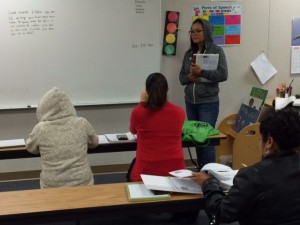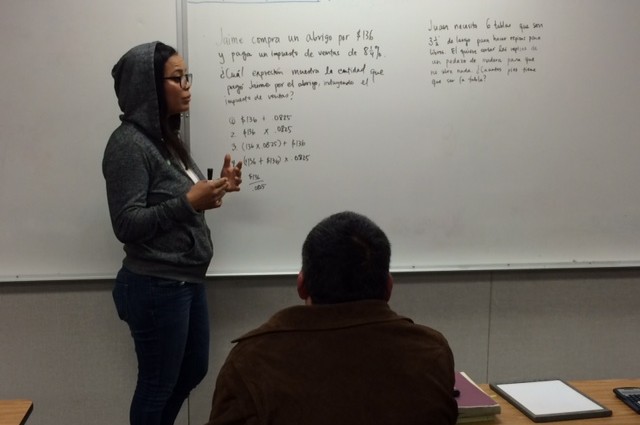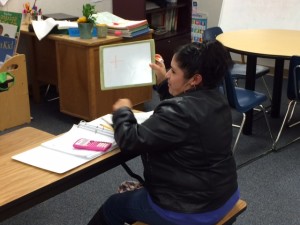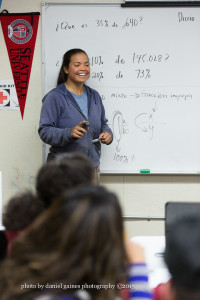One of Puente’s most dedicated volunteer teachers is a 29-year-old Latina farmer named Flor. To the seven adult students in her math class, she is the face of success, but on familiar terms. A Guatemalan immigrant, Flor Revolorio is college-educated, earnest, serious and smart. She also works and lives on a farm.
Which means that twice a week on Tuesdays and Thursdays, Revolorio takes the bus to Puente. Like many of her students, she works an extra-long shift in the summer and doesn’t own a car.
And when it comes to teaching math, Revolorio makes use of common real-world experiences and cultural touchstones to help her students grasp concepts like fractions and algebraic equations.
“Culturally we’re very similar, so I can draw on so many references to things I know relate to us,” says Revolorio, who looks laid-back and youthful in skinny jeans, a gray hoodie and stylish black-framed spectacles.
Revolorio is helping her students prepare to pass the math component of their high school equivalency – either through the GED test or the HiSET exam, an alternative program approved in California. But her overarching mission is much broader: she wants to empower them.

GED preparation
“I want them to pass the tests, but I want them to ask questions, too. How their children are being educated, what kinds of books they’re being taught in school. Their knowledge gives them a voice,” she says.
Revolorio is a classic example of someone in the community who has some valuable skills to offer: the ability to teach math, fluency in Spanish, and the willingness to commit to her role says Puente Executive Director Rita Mancera. “She’s taken her work as a teacher very seriously, which is amazing because she has built long-term relationships on volunteer basis.” Revolorio also happens to have a gift for connecting to her students on a human level, making lessons accessible and fun. “I’ve witnessed her class many times,” adds Mancera. “I see that ‘aha’ moment in the students when they understand the math concepts and I think Flor’s an incredible teacher.”

Flor at work
Mancera is calling on other native Spanish speakers in the area to step up as tutors in Puente’s adult education program. To attain their high school equivalency, students need to pass tests in math, science, social studies, history and language arts. But without more volunteer tutors like Flor Revolorio, Puente students will only be able to learn sequentially, as volunteers become available to teach each subject.
Puente’s adult classes are more in demand than ever. In addition to Revolorio’s high school-level math class, Puente offers basic literacy classes through Plaza Comunitaria, a program sponsored by the Mexican government to help Mexican citizens living in the United States continue with their primary and secondary education. Puente’s three levels of ESL instruction are so popular that students return year after year. The Silicon Valley Community Foundation generously provides principal funding for the entire adult education program.
When students are ready to continue their education beyond high school, Puente offers programs to help them on their way. The Consulate General of Mexico in San Francisco provides college scholarships to adults pursuing higher education. Puente is also part of La Costa Adult School, a new Coastside adult education program that resulted from state legislation AB86.
With a high school degree, Revolorio’s students know they could pursue a new career or get paid more for the work they already do. Some, like Leticia Sanchez, also use the class material to help them parent their high school-aged children.

Leticia in class
Sanchez, a 39-year-old mother of four, is a bright pupil in Revolorio’s math class. She is also enrolled in level 3 ESL, Puente’s most advanced ESL class. Which means that on Tuesday and Thursday nights, she studies back-to-back from 4 to 8 p.m.
As a child, Sanchez stayed in school for as long as she could – which was through the end of middle school in Guanajuato. Her parents couldn’t afford to send her to high school. Now she is claiming the education she left behind.
“English and math classes help me help my children, because they ask me about their homework… And it’s setting a great example for my kids so they can keep on studying,” Sanchez says. “It’s important for them to understand that when they get married, they can continue with their education – just like I did.”
The benefits of a math education are not merely theoretical. Sanchez has been able to apply her lessons to her everyday life from the start.
“Before, I didn’t know what a fraction or a percentage was. And now when I go to the store and I see signs for discounts, I can figure it out,” she says with a smile.
The prospect of earning a high school equivalency can be quite daunting – especially for parents who struggle with balancing their schoolwork with their job and family commitments. But it’s not insurmountable. Within the Puente program, most students know the names of Eufemia Castro and Liliana Villalobos, two local women who managed to work full-time and still pass their GED tests in the summer of 2013. It took them nearly four years, and they received one-on-one tutoring in each subject from Puente staff. Eufemia and Liliana are both enrolled in community college, pursuing a degree in Early Childhood Education.
“Once Eufemia and Liliana finished, it made other people realize, ‘All right, it’s possible,’” says Mancera. “The sooner you take the first step, the sooner you can move forward.”
Revolorio says there are two students in her math class who are close to being ready to pass their exams. One of the challenges all her students face is their fear of asking questions. There’s a sense of shame sometimes for adults who feel they should already know the answers. “I’m teaching students it’s okay to make mistakes. I’m teaching them to communicate with each other and not be scared,” she says.

Flor with students
She enjoys teaching with Puente, as social justice and education are her primary passions.. Years ago, she gave up a full time career as a credentialed elementary school teacher to work in the field of environmental conservation. Later on, her interest in conservation fused with the stewardship potential of agriculture. Today, she is Assistant Farm Manager at Pie Ranch, south of Pescadero. “I think education is an excellent vessel for individual agency, especially when it’s rooted in critical thinking,” Revolorio says. “For me, farming is very political; it’s an act of social justice. Soil health and food sovereignty are the reasons I farm. Volunteering at Puente allows me to leverage my privilege and connect to my immediate community.”
It was Revolorio’s own idea to organize Puente’s high school equivalency program by class and subject, rather than have tutors like herself answer ten questions a night from individual students who were all focused on their own workbooks and not studying together.
“I thought, there’s a lot of knowledge in this room already. Why don’t we learn from each other?” she recalls.
In her classes now, she pushes her students to explain math concepts to each other, not just to answer her questions by rote. It makes them uncomfortable. But that kind of discomfort can be valuable in terms of fostering a sense of self-reliance.
“We have this notion that teachers know best. I want them to understand that they know a lot more than they think they know,” says Revolorio.
Are you fluent in Spanish? Want to volunteer for Puente’s adult education program? For details, contact Volunteer Coordinator Abby Mohaupt at (650) 879-1691 Ext 114 or amohaupt@mypuente.org.




